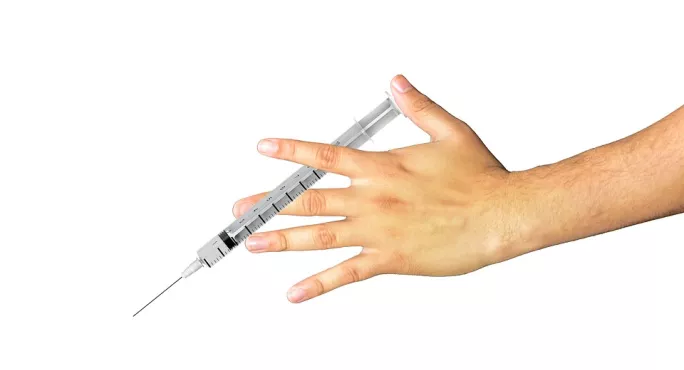- Home
- Health secretary doesn’t rule out banning unvaccinated pupils from school
Health secretary doesn’t rule out banning unvaccinated pupils from school

Health secretary Matt Hancock has said that he “wouldn’t rule out anything”, when asked whether unvaccinated children should be banned from schools.
Speaking on Talk Radio, Mr Hancock said the UK was “not there yet” when it came to issuing a ban, as has happened in France, Italy and certain US states.
Long read: How anti-vaxxers put pupils and teachers at risk
Comment: Anti-vaccination propaganda puts pupils and teachers at risk
Insight: Teachers at risk of ‘one of the most infectious diseases’
A ban on unvaccinated children in public places in Rockland County, New York, which has experienced a measles outbreak, was put on hold earlier this month after parents challenged the decision.
But last week, a Brooklyn judge upheld an emergency order, which stated that people living in certain parts of Williamsburg, Brooklyn, must be vaccinated.
Mr Hancock was speaking on Julia Hartley-Brewer’s breakfast show, after new figures from charity Unicef showed that more than half a million children in the UK had not been vaccinated against measles between 2010 and 2017.
He said he was very worried about the issue, adding: ”It’s a responsibility on everybody to get vaccinated.”
Mr Hancock was asked by Ms Hartley-Brewer if he would consider meeting the education secretary, Damian Hinds, to discuss “following in the footsteps” of France and the US.
He replied: “I wouldn’t rule out anything, but I don’t think we’re there yet.
“In America, they tried to do this and the courts stopped them, so it can be complicated. But, really, it’s people’s responsibility as a parent to do the right thing - the right thing for their own children as well as, of course, the right of the community that everybody lives in.”
Earlier, Mr Hancock said the rise in people refusing to vaccinate their children had to be addressed, and that he was “particularly worried” about the spread of anti-vaccination messages online.
He told BBC Radio 4‘s Today programme that he was meeting social media companies on Monday to “require that they do more to take down lies that are promoted on social media about the impact of vaccinations”.
Asked whether children who have not been vaccinated for measles should be excluded from schools, the prime minister’s official spokesman said: “I haven’t seen anyone suggesting that.”
Unicef’s analysis shows that increasing numbers of children around the world are being left unprotected against measles, which can cause disability and death.
Its report shows that an estimated 169 million children around the world missed out on the first dose of the measles vaccine between 2010 and 2017 - an average of 21.1 million per year.
Simon Stevens, chief executive of NHS England, said: “Getting yourself and your children vaccinated against killer diseases is essential to staying healthy, and vaccine rejection is a serious and growing public health time bomb.
“With measles cases almost quadrupling in England in just one year, it is grossly irresponsible for anybody to spread scare stories about vaccines, and social media firms should have a zero-tolerance approach towards this dangerous content.”
A list of 10 high-income countries, published by Unicef, shows that the US has the highest number of children missing out on their first dose of the vaccine.
Between 2010 and 2017, some 2,593,000 children in the US did not have their first dose of the vaccine.
The second most affected country was France, with 608,000 unvaccinated children over the same time period, followed by the UK, with 527,000.
Other countries, including Argentina, Italy, Japan, Canada, Germany and Australia, also made the top 10.
Children need two doses of the vaccine for protection, with the World Health Organization (WHO) recommending 95 per cent coverage to achieve herd immunity, which offers protection against the disease spreading in the community.
In the UK in 2017, there were 259 measles cases in England, rising to 966 in 2018.
In 2016 and 2017, uptake of the first dose of the MMR vaccine among five year olds in the UK exceeded 95 per cent for the first time.
However, two doses of MMR vaccine are required to ensure full protection from measles.
Uptake of the second dose of MMR among five-year-old children is 88 per cent - well below the 95 per cent WHO target.
Figures from October to December 2018 show that nine out of 10 children had received their first dose by age 2, rising to 95 per cent by age 5.
By age 5, 87 per cent had had their second dose, the quarterly figures show.
Mary Ramsay, Public Health England’s head of immunisation, said: “The UK achieved WHO measles elimination status in 2017 so the overall risk of measles to the UK population is low.
“However, due to ongoing measles outbreaks in Europe, we will continue to see cases, particularly in unimmunised individuals.
“This could lead to some spread in communities with low MMR coverage and in age groups with very close mixing.
“Measles can be extremely serious, so make sure you and your family are protected.”
Globally, 85 per cent of children received their first dose in 2017, and 67 per cent received the second dose.
Unicef said the rates reflected “lack of access, poor health systems, complacency and, in some cases, fear or scepticism about vaccines”.
Keep reading for just £1 per month
You've reached your limit of free articles this month. Subscribe for £1 per month for three months and get:
- Unlimited access to all Tes magazine content
- Exclusive subscriber-only stories
- Award-winning email newsletters



